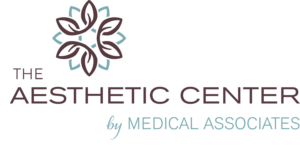The Aesthetic Center by Medical Associates
What’s the Right Age to Begin Botox®?
Botox is the most popular minimally invasive cosmetic procedure in the US, with nearly 4 million treatments being performed in 2021. It is very effective at combatting fine lines, crow’s feet, forehead wrinkles, and frown lines. But what if you could use Botox as a preventive measure to deter those signs of aging? If you’re wondering when to start Botox, our experts explain how the product works and when might be the most effective time for you to achieve your goals with the help of Botox.
How does Botox work?
Botox is a neurotoxin derived from Clostridium Botulinum, and is found in soil, lakes, and forests. It can be very toxic if you are exposed to too much of it, so it’s very important to receive Botox treatments from a trained professional. The expert providers at The Aesthetic Center by Medical Associates are knowledgeable about the appropriate dosage and know where to inject the Botox to alleviate wrinkles while still preserving your ability to make facial expressions.
The Botox product used for injections comes in powder form and is mixed with saline prior to injection. When you frown, smile, or furrow your brow, your facial muscles contract and crease the skin over and over. As your skin ages and loses elasticity, this creasing can leave permanent lines. To reduce wrinkles, Botox is injected to temporarily relax targeted muscles so that these creases do not form.
Treatments are quick, convenient, and an affordable option for many. Apart from your initial consultation, appointments are usually only 15-20 minutes. You can also return to work or activities immediately after receiving Botox.
When should I start treatments?
There is not magic number, as everyone ages at an individual pace. Most people wait to seek treatment until they start to see wrinkles. This is a good method for many and can absolutely be effective. But if you want to prevent the earliest fine lines from becoming full-blown wrinkles, preventive Botox could be the solution.
By injecting the muscles that typically cause wrinkles around the mouth, eyes, and eyebrows with Botox before wrinkles start to emerge, you can essentially prevent (or at least delay) wrinkles from developing in the first place. Botox will slow down the use of those muscles and therefore slow the appearance of those age marks.
Botox is approved for patients who are 18 years and older and most experts agree that patients in their mid to late 20s and early 30s are at a good age for preventive Botox treatment. It’s unlikely that you’ll have enough lines to cause concern before your mid to late 20s, so any earlier than that is probably unnecessary.
Am I a good candidate for preventive Botox?
Look at yourself in the mirror and think about your older family members. Certain wrinkles are often genetic. Do they purse their lips, furrow their brow, or seem to have a permanent frown? If you are noticing fine lines that mimic what you see in your older relatives, this might be a good sign to seek treatment.
Our providers can identify areas to inject that help train your facial muscles to no longer fall into these positions. Treating these areas early can prevent the formation of deeper or more noticeable wrinkles. It will also help you need less Botox as you age. Typically, the effects of Botox treatments last about three to four months, but you may be able to space preventive treatments out to once or twice a year. Keeping those certain muscles relaxed could make your Botox treatments last longer.
It’s also important to note that Botox won’t work for all wrinkles. If your face is wrinkled due to sun damage or an unhealthy lifestyle, Botox can’t help you. You need to do your part to prevent sun damage, eat healthy, and take care of your skin to prevent these types of wrinkles, as Botox is meant for wrinkles that you are genetically predisposed to.
Although we can’t give you a definitive age when to start Botox, we hope this gives you a better understanding of who preventative Botox can work for and if it’s right for you. If you want to learn more or see if you’re a good candidate for Botox, give us a call at 563-584-3444 to schedule a free consultation.
Sources:
https://www.cosmeticsurgery.org/
https://www.aad.org/public
